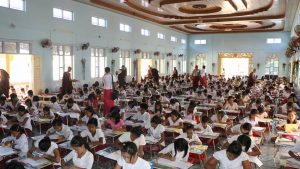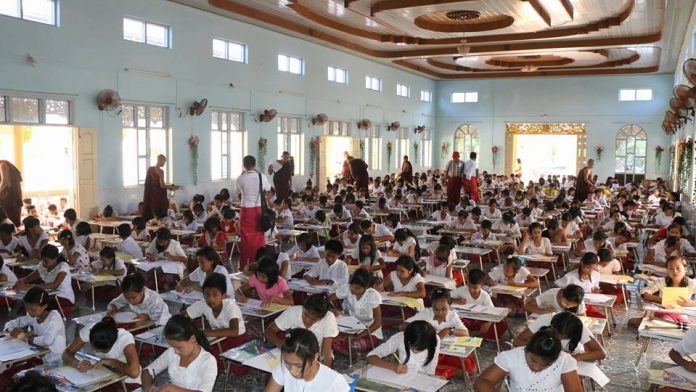Healing for improving living standard
Crime against the religion is widely occurred in Burma in my life time. We were instructed that we shall not engage in public affairs regardless of the good and the bad impacts for the country. Although Buddhist monks are selflessness and devoted for social welfare of the ordinary people, the voices of the senior monks are not being heard in public affairs unless a local gathering for chanting is organized in the temple. The voice of the progressive monks has been marginalized from the public arena since 1962, after a coup by General Ne Win. However, the inspiration of the monks has never died and indeed, the Saffron campaign that appeared to the world in the second week of September has once again given me sense of hope and a courage to campaign along with global alliances. Rev. Palita, a historian who published over 50 books and hundreds of articles in Mon language, was imprisoned for his political opinion by publishing a journal against the policy of New Win’s government on racial discrimination toward the Mon people and all other ethnicities.

The Shwe Kyin Monk Association is one of the monks’ institutions who uphold the code of conducts of the Buddhist teaching, and the senior monks always distance themselves from any involvements to the Department of Religious Affairs. In Buddhist practice, the monks obtain highest moral authority and the laymen have no moral authority to force the monks whatsoever in religious affairs.
Forgiveness for good discourse
It is totally ugly and wrong for the senior military government to order security guard to shoot and kill the monks in cold blood on the street, which highlighted that Burma is not a safe country to live in, not even to do business in the long term, as long as the military used its military mighty to oppress its fellow citizens. The monks and their core institutions have moral duty to protect the lives of their fellow countrymen and women for the longevity of Buddha’s teaching in a peaceful country. The senior military officials wasted all resources provided by the monks in building national reconciliation and peaceful transition. Most senior monks who served the Monk Supreme Council have been left the position of protest since 1990 after the military council denied to transfer public authority to the winner of the general election. Historian Trevor Ling (1979) suggests that one is that enmity is one of the three fundamental roots of evil and of suffering, and that enmity is never overcome by enmity; enmity is overcome only by non- enmity.
The monks and the military council (formally known as State Peace and Development Council), never have a mature relation in public affairs. The majority monks need space to engage in public affairs as their fellow religious leaders, such as Christian leaders, attained highly regarded moral authority in the Western world. The Burmese monks have been devoted to social cohesion of the inter-ethnic community in the country and served as volunteers to the welfare of local poor people over many centuries. The role of the monks has been diminished seriously in late 1990 with a new market economy in the country. A moral authority of the monk’s council also under treat with a misdeed of military council’s role in internal religious affairs. The monastic education system of the Mon council were placed under the hand of the military council in 1984 whereas many non-Burmese monks, especially the Mon monks, left the temples then jointed the anti-government forces in late 1980s.
Local Action for Local Answer
It is lack of judgment of the military council and its misuse of public authority on education, health, social welfare in the last over forty years in which brought the monks on the street with end of patient for changes. For the long term of Burma’s national interests, Buddhist monks should have space to voice their concerns on public affairs. Both China and India have no long terms interests on Burma, unless Burma a is source of oil and other natural resources for their commercial interests. A fear of change is the worst fear in mind and heart of the senior council. Most senior monks have moral authority to bring peace and national reconciliation in Burma. The military council should use these alternative assets to break the deadlock in the country instead of killing and arresting the monks. It is a waste of opportunity in political terms.
Burma, my home country in heart and my motherland in soul, is a place of prosperity and a spiritual land for all human beings if the country is safe and the land ruled under the laws. As the global alliances are campaigning for changes, Burmese monks and fellow citizens still hold hope with courage and build solidarity for this critical social and political change with costs. Killing is a crime by all means. The voice of the moral authority and the hope of human beings will be accomplished when all stakeholders share equal interest, win-win solution and build a new nation where monks, nuns, students, soldiers and fellow citizens live in peace and die in dignity.
Education for All
The strength of the Buddhist monks is undermined by the government in building national reconciliation and peaceful transition toward democracy. The human resource of the monks is essential for all partners in building the nation for peace, social justices, and developments in all aspects of governance. They attain both intellect and morality to provide services and skills to ordinary people across the road. It is a total mistake for any politicians and leaders of the new political elites of Burma to undermine the role of the Monks’ institutions, which have been providing free education and social services to the people in the last over 30,00 years in Burma and beyond. The monks are our assets and a resourceful organ in terms of community education, social services, and social justice among people for all races and religions. They have learned and lived with discipline and moral authority for over 20-30 years to attain the highest level of Buddhist’s education (equally to Social Sciences to current academic institutions in western world), and they have upheld the Pa-li text that were been using in central Asia for over 2000 years. They are selflessness and devoted to the people for social harmony and build peace and prosperity with wisdom. We have been lucky in Burma to have this institution, which has given basic community and social services to the people in Burma.
Burma / Myanmar will be a nation of hope and peaceful development in the next 20-30 years when local monks and other religious leaders share the pain and gain as a nation. It is action for local answers to local problems. Education for all children shall be provided by government, non-government and monastery equally. Rural community development shall be integrated within the norm and context of local community in terms of religious beliefs and other considerable community practices under the influence of the local monks. A call for federal of governance will never be completed unless an integration of education, health care and community participation is guaranteed by the legislations. The integration for rural community development shall be looking at least in collaboration with local monks and other faith leaders.

